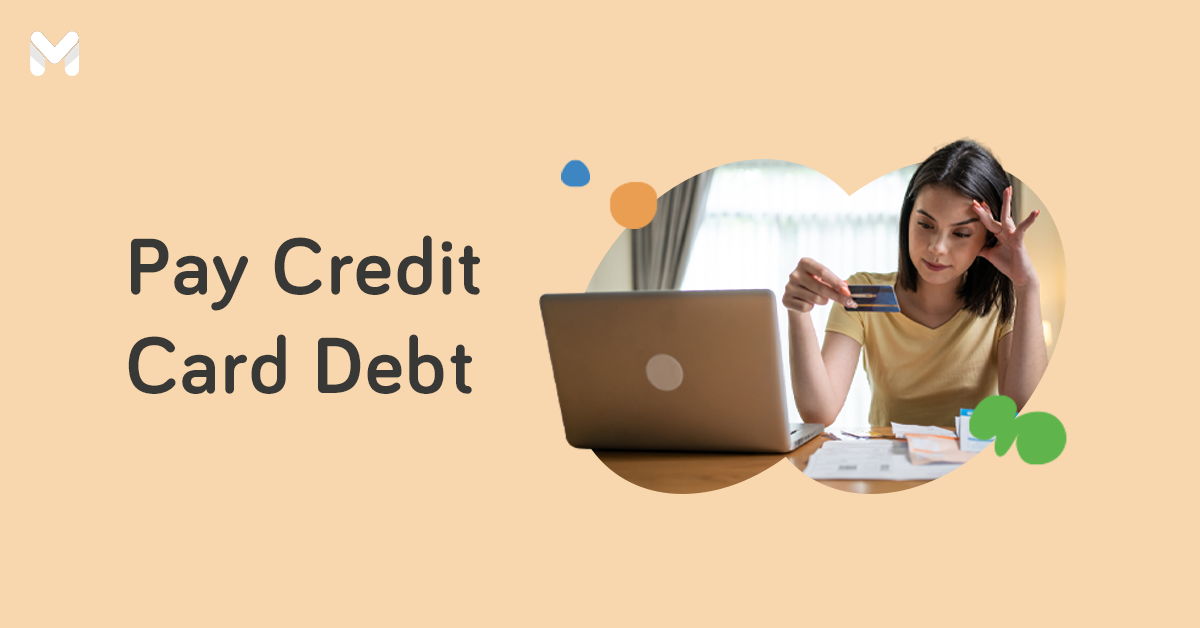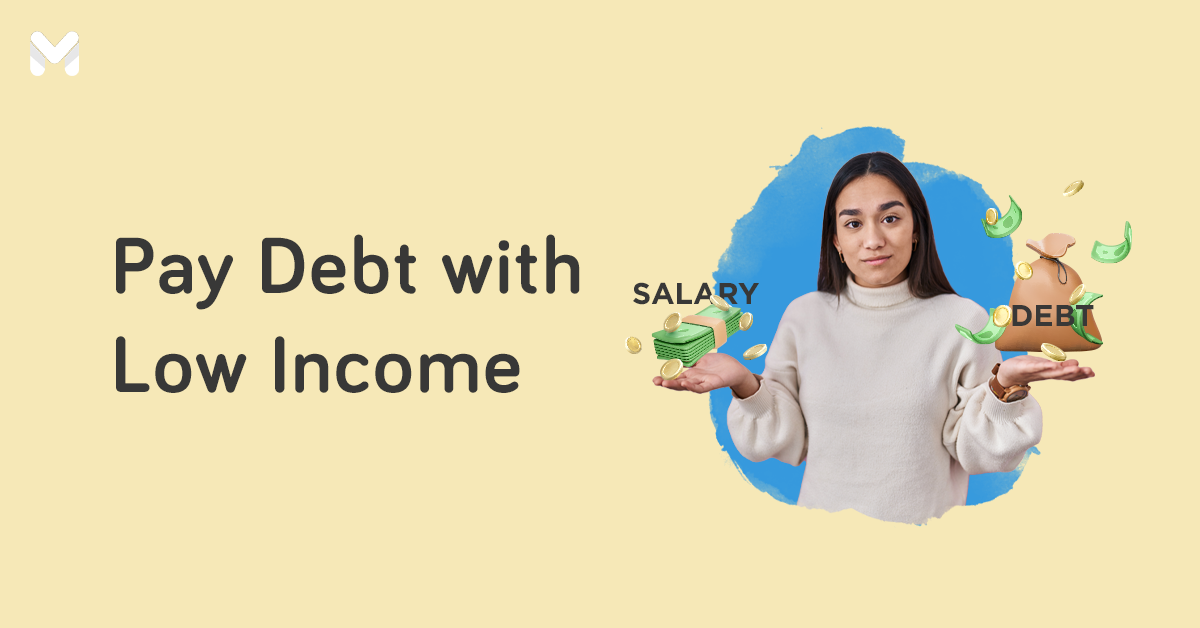Nobody wants to find themselves mired in debt. But it does happen when debt is managed poorly.
It's as bad for one's mental health as it is for the wallet. So how to get out of debt in the Philippines? First, don't wallow—take proactive steps. Resolve firmly to pay off what you owe.
Learn what concrete steps you can take to solve your debt problems and get your finances back on track.
How to Get Out of Debt in the Philippines
There's more than one type of debt to deal with. Strategize based on your debt and work your way from there:
💳 How to Get Out of Credit Card Debt
-Apr-25-2024-10-09-34-8299-AM.png?width=600&height=400&name=Pics%20for%20blog%20-%20600x400%20(26)-Apr-25-2024-10-09-34-8299-AM.png)
₱680 billion—that's how much credit card debt Filipinos have as of February 2024, based on Bangko Sentral ng Pilipinas data. Meanwhile, the credit card delinquency rate is at 3.26%.[1]
Unpaid credit card balances easily accumulate. One seemingly harmless swipe at the department store can snowball into hard-to-manage debt.
Credit card debt is one of the most challenging types of debt to pay off, mainly because of two things: low minimum monthly repayments (ranging from only 3% to 10% of the total outstanding balance) and credit card fees on top of the unpaid balance.
If you're wondering how to get out of credit card debt, know that the situation won't last and you'll get out of it—but only if you start paying it off now. Here's how to tackle your credit card debt:
Know How Much You Have to Repay
Request an updated credit card statement from each provider. List down your total outstanding balance and interest rate for each credit card.
Estimate How Long it Will Take to Repay
Take stock of your income and expenses. Then determine the amount you can set aside for your monthly repayments. In doing so, you can set a timeline for paying off your credit card debt.
Pay off the Card with the Lowest Debt or Highest Interest Rate First
There are two popular ways to pay off not just credit card debt but also all other types of debt: debt snowball and debt stacking.
With the debt snowball method, you pay off the smallest debts first. This reduces the number of debts faster. However, it could cost you more, as your higher-interest debts get bigger as time goes by.
Meanwhile, with the debt stacking method, you start paying off the card with the highest interest rate. Arrange your credit card debts from highest to lowest interest rate, then pay them off in that order.
Ask for Credit Card Debt Restructuring
How to get out of debt when you are broke? Contact each credit card provider. Inform them why you can't immediately pay off your unpaid balance and what you can realistically afford.
Then negotiate a credit card debt restructuring program. The bank may agree to lower your interest rate and/or extend your repayment term to make your monthly payments more affordable.
Consider applying for the Interbank Debt Relief Program to settle your unpaid balance more easily.
Get a Balance Transfer Credit Card
You might want to move your credit card debt to a balance transfer card with 0% interest. This type of card allows you to repay without incurring extra interest.
Note that the 0% interest offer is good for a limited time only and changes to a higher rate after the introductory period. Make sure to pay off your credit card debt before that period ends.
Read more: 6 Ways to Get Out of Debt Faster Despite Having Low Income
💰 How to Pay Off a Personal Loan
-Apr-25-2024-10-12-09-9048-AM.png?width=600&height=400&name=Pics%20for%20blog%20-%20600x400%20(28)-Apr-25-2024-10-12-09-9048-AM.png)
When used for the right reasons and managed responsibly, a personal loan can help you meet your short-term goals such as renovating your home, hosting your dream wedding, or funding your children’s education.
On the other hand, failure to make timely loan payments will land you in serious financial trouble, like debt. Worse, it can hurt your credit history—making it hard for you to qualify for other loans in the future.
Here's how to be debt-free in the Philippines if you have a personal loan:
Plan Your Repayment Strategy
If you fail to plan, you plan to fail. This saying could not be truer when it comes to loan repayments. If you have no idea how to pay off your loan, you're setting yourself up for failure.
A plan is particularly important if you have different types of debts to settle, such as credit cards and housing or auto loans.
Look into how much you owe the bank, including your loan’s interest rate, monthly amortizations, and the loan term. Also, list down the due date of each loan.
Such information will help you decide which needs to be paid off first. Create a strategy on which loan to prioritize—perhaps the one with the lowest balance, the one with the highest interest rate, or the one with the earliest due date.
Feeling overwhelmed with managing several loans? Consider debt consolidation for easier and faster repayments. If you're looking for debt consolidation loans, check out the UnionBank Personal Loan:
Find Ways to Increase Your Income
Struggling to pay off your monthly balances even if you already control your spending? Your income may be insufficient to cover your expenses, including loan repayments.
So how to get out of debt on a low income? Consider getting an extra source of income, like a side business or a part-time job. This is a small sacrifice to make compared to missing monthly repayments and paying more interest in the long term.
If a family or a friend asks to borrow money during this time, refuse. Saying yes will most likely compromise your own finances while you're paying off your debts.
Avoid Taking on New Debt with High Interest
Looking into loan sharks so you can borrow money to use for loan repayments? You only run the risk of racking up more debt.
Either reduce your spending or increase your income. Better yet, do both.
Negotiate with Your Lender
Exhausted all means to manage your loan but still falling behind on monthly payments? Or was there a financial emergency that kept you from making timely payments?
If you find yourself in such situations, it's best to reach out to your lender, explain your case, and work with them on a solution.
Ask the bank to restructure your personal loan. Your bank may reduce your monthly installment amount, extend your loan term, or reduce your loan’s interest rate. Of course, a loan restructuring comes with strict conditions you'll have to follow.
Related: Pay Off Your Loan Easily: Your SSS Loan Restructuring Guide
🏡 How to Pay Off a Home Loan
-Apr-25-2024-10-10-38-8973-AM.png?width=600&height=400&name=Pics%20for%20blog%20-%20600x400%20(27)-Apr-25-2024-10-10-38-8973-AM.png)
With the constantly increasing prices of real estate property in the country,[3] it's almost impossible to afford a house without a home loan.
However, they take years to pay back. Aside from paying off a sizable amount of money, you have to deal with interest rates, mortgage insurance, and other additional fees.
But owning a house is worth all these troubles. Here's how to get out of debt and save your home from foreclosure:
Make Drastic Adjustments to Your Budget
Because a home loan takes longer to repay, you need all the adjustments you can make to your budget. Cut expenses you don't need and sell assets to help fund repayments. Consider adding more sources of income as well.
Make More Frequent Payments
How to get out of debt quickly? Make more frequent payments exceeding your monthly amortization. Take advantage of lump sum earnings like your 13th-month pay and annual bonuses.
This will help decrease the cost of your loan and reduce your loan term in the process.
Negotiate Your Home Loan
It never hurts to ask. Try to negotiate your loan terms with your bank. Depending on the agreement, they can either adjust your grace period, restructure your loan, or decrease your interest rate.
Just be upfront about your current situation and you'll surely get a fair solution to your problems.
Refinance Your Home Loan
Having a hard time? Refinance your loan for more manageable terms.
Refinancing involves paying off your existing home loan with another loan from a different provider. The goal is to get a new home loan with lower interest rates or more flexible loan terms.
Most banks in the Philippines offer home loan refinancing to help distressed homeowners pay off their debts. But before you avail of one, weigh the pros and cons to see if it's the best way to get out of debt given your situation.
Read more:
- What Should I Do in Case of Non-Payment of Loans in the Philippines?
- Dear Lender: Go Easy on Me! It’s Pandemic and I’m Bankrupt, er, Insolvent
🚗 How to Pay Off a Car Loan
-Apr-25-2024-10-13-27-2162-AM.png?width=600&height=400&name=Pics%20for%20blog%20-%20600x400%20(29)-Apr-25-2024-10-13-27-2162-AM.png)
Here's the scenario: when you took out a car loan, you were confident you could afford the down payment and monthly amortizations because you had a stable job that paid well.
But then the unexpected happened. You lost your job, a family member fell ill, or a natural disaster damaged your home. Whatever the case, your finances got messed up and you can no longer afford to repay your car loan.
So how do you deal with such a situation? Here's how to get out of debt in the Philippines and avoid heart-breaking vehicle repossession:
Make Additional or Lump-Sum Repayments
To pay off your car loan faster, pay more than your monthly amortizations. While this sounds like a challenge given your difficult financial status, try to find ways to increase your income and use the extra earnings to pay your car loan.
Modify Your Car Loan
Car loan modification, if your lender allows it, is another way to make overdue car loan payments more manageable. With this option, your bank lowers your interest rate and monthly amortizations by extending the repayment term or suspending/lowering monthly payments for a limited time.
Call the bank to explain why you can't repay your car loan with its current structure. Ask if they can modify your loan so you can afford to pay it off.
Refinance Your Auto Loan
Are your monthly car loan payments taking up much of your budget? Consider switching to a new loan with a different lender. Look for one with more favorable terms, like a lower interest rate and lower monthly repayments.
👥 How to Pay Off Debt from Other People
-Apr-25-2024-10-14-39-3702-AM.png?width=600&height=400&name=Pics%20for%20blog%20-%20600x400%20(30)-Apr-25-2024-10-14-39-3702-AM.png)
How to get out of debt in the Philippines if it involves family or friends? Since it's an informal type of debt, it doesn't involve written loan agreements, interest rates, and physical collateral.
Payment terms are flexible, as the borrower and lender undergo an arrangement based on trust. When this trust is broken because of failure to pay, the relationship gets ruined.
What should you do if you want to pay back the amount you owe but currently don't have the means to do so?
Communicate Constantly with Your Lender
Nothing irritates a lender more than giving them the impression you have no plans to pay back your debt. Explain what keeps you from paying off your debt and assure them you're taking action to solve it.
Also, constantly update the lender regarding when and how much you can repay per period. Even if you can't repay it in full in one go, make an effort to pay back a portion of the amount per week or month.
Related: Until “Debt” Do Us Part? What You Should Know If You're Marrying Someone with Debt
Final Thoughts
Now that you know how to get out of debt in the Philippines, make it a priority so you can move on to your other financial goals. When things get tough, never lose sight of your main goal: to finally become debt-free and gain financial freedom.
Sources:
- [1] Consumers in the Philippines take on more debt, save less (ING, 2024)
- [2] Steady drop in credit card deliquencies seen (Philippine Star, 2023)
- [3] Residential real estate prices up in Q4 2023 (Philippine News Agency, 2024)







_1200x350.png?width=751&height=219&name=UB_PL_Generic_2_(Jan_2025)_1200x350.png)
_1200x350.png?width=751&height=219&name=UNOBank_Loan_Generic_Ad_(Apr_2024)_1200x350.png)

.png)

